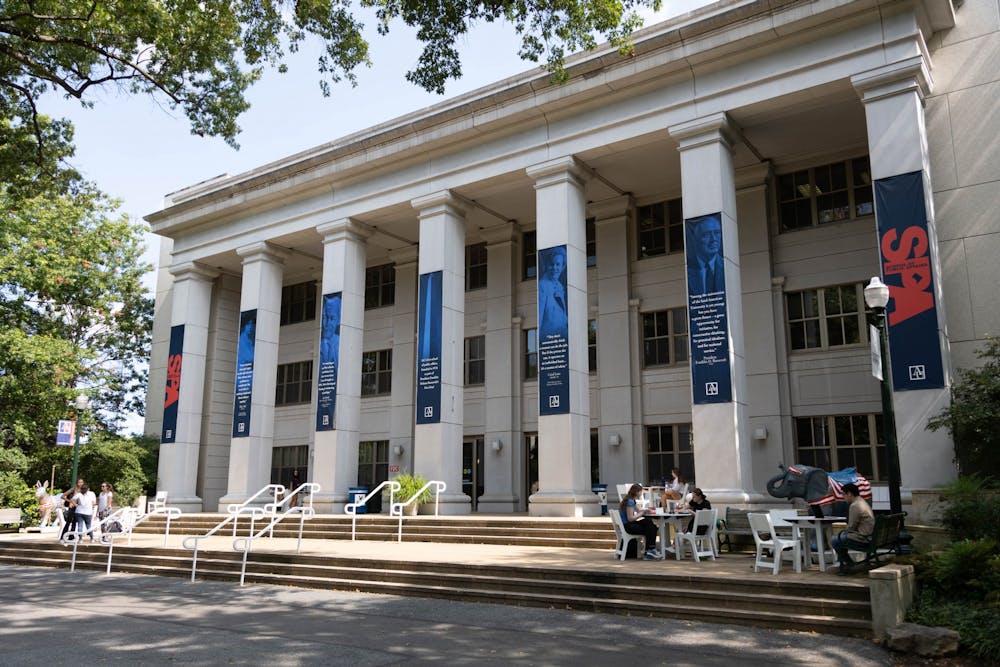American University’s School of Public Affairs ranked tenth in U.S. News & World Report’s evaluation of the best public affairs graduate programs in the country. The ranking signifies the second consecutive year that SPA has received the highest rating among public affairs schools in D.C.
The methodology U.S. News & World Report uses to compile its annual ranking consists of peer assessment surveys sent to institutions nationwide. Surveys used in the most recent edition were completed in fall 2021 and spring 2022 by the deans, directors and department chairs of 270 master’s programs in public affairs and administration.
SPA was also recognized for its expertise in these nine specialty areas:
- Public Management and Leadership
- International Policy and Global Administration
- Nonprofit Management
- Homeland Security and Emergency Management
- Public Financing and Budgeting
- Public Policy Analysis
- Urban Policy
- Social Policy
- Local Government
Survey respondents rated their peer institutions on a scale of one to five, from marginal to outstanding in academic quality. The scores for each school were averaged according to the number of participating respondents and the final ranking was determined. SPA moved up three spots from the previous ranking in 2021.
Senior Association Dean for Academic Affairs Alison Jacknowitz works closely with the Dean of SPA, Vicky Wilkins, to complete the annual peer assessment survey of other universities. Jacknowitz said they look primarily at an institution’s research and faculty when determining scores. However, Jacknowitz said that she and Wilkins are usually familiar with their peers’ programs before the assessment process even starts.
“Leading up to filling out the ballots, a lot of schools send out newsletters and pamphlets and a lot of different communication kind of highlighting accomplishments and achievements of their faculty,” Jacknowitz said. “Starting in September, October we get a lot of communication from all the schools of public affairs.”
According to Jacknowitz, SPA’s communication team dedicates time in the summer and early fall to prepare similar materials that are then sent out to other public affairs institutions ahead of the assessment period.
Wilkins said she is enormously proud to know that SPA is well-regarded by peer public affairs master’s programs.
“I am not sure everyone understands, these are rankings that come from our peers,” Wilkins said. “It’s really a reputational ranking … and to have our work recognized in this way by our peers is just incredible to me.”
Asher Weinstein is a second-semester graduate student pursuing a master’s in public policy from SPA. Weinstein said SPA’s prestige played a big part in his decision to remain at AU and take advantage of the combined degree program, which allows students to reduce the time it takes to complete both a bachelor’s and master’s degree.
“I have to say the one thing that surprised me hearing about this ranking wasn’t how high AU was, it was that I wasn’t aware we weren’t ranked that high before,” Weinstein said. “The proximity to D.C., obviously being in it, and the kind of connections I thought that AU would be able to provide were what drew me to this grad program.”
Weinstein said he thinks that SPA’s higher ranking will communicate the benefits of studying public affairs in the nation’s capital to prospective graduate students.
“It tells you that this is a degree that’s going to give you credibility in your field after, which obviously helps a lot,” Weinstein said.
Both Weinstein and Wilkins said engaged faculty is the distinguishing factor that sets SPA apart from other graduate institutions. Weinstein said that a public housing policy course he took last semester, taught by Professor Derek Hyra, stands out as an example of how active the SPA faculty are in their areas of expertise.
“Not only was I able to get the kind of history and policy lessons from his class but I know that he does this work in the community right now,” Weinstein said.
Hyra founded the Metropolitan Policy Center at AU in 2014. The MPC researches to inform solutions to 21st Century urban challenges such as affordable housing, economic development and diversity.
“I’m most proud when I talk about the fact that we have, I believe, faculty that choose to select on to being at SPA because they want to be in a place where we really care about teaching,” Wilkins said. “But also really know that we have, with our students, the ability to have an impact.”
Wilkins described this impact as the way SPA engages its local communities, influences federal policymaking, and works with NGOs and nonprofits. Wilkins said she hopes both current and future SPA students interpret this ranking as a reflection of what SPA has to offer.
“I always say that rankings are the things that happen as we do good work and not the goal, but I could not be happier that people are noticing the way in which SPA is speaking to the problems of today, researching critical issues and being visible in the world for what we are,” Wilkins said. “It was a big jump up by three and so it came as a surprise.”





